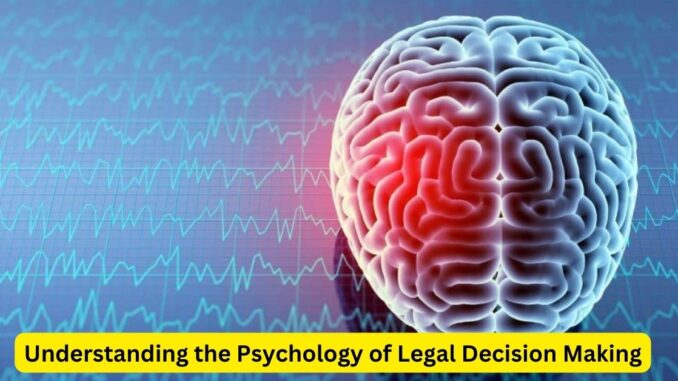
Legal decision-making is a complex and multifaceted process that involves a delicate interplay between cognitive, emotional, and social factors. Lawyers, judges, and jurors alike are subject to a variety of psychological influences that can shape their decisions in the courtroom. Delving into the psychology of legal decision-making unveils a fascinating realm where human behavior intersects with the principles of justice.
- Cognitive Biases in Legal Decision Making:
One of the key elements influencing legal decision-making is cognitive bias. Judges and lawyers are not immune to the same mental shortcuts and biases that affect people in everyday life. Confirmation bias, for instance, can lead legal professionals to favor information that supports their preexisting beliefs, potentially compromising the objectivity of their decisions. Awareness of these cognitive biases is crucial for those involved in the legal system to ensure fair and impartial judgments.
- Emotional Influences:
Emotions play a significant role in legal decision-making. Lawyers must consider the emotional impact of their arguments, while judges and jurors may be swayed by their own emotional responses to the case. Empathy, for example, can influence sentencing decisions, with judges taking into account the emotional context of a crime. However, emotions must be carefully balanced with reason to avoid subjective judgments.
- Legal Precedents and Decision Making:
Legal decisions are often based on precedent, a principle deeply rooted in the legal system. However, the psychology of decision-making also reveals the influence of “anchoring,” where the first piece of information encountered sets the tone for subsequent judgments. This cognitive bias can affect how legal professionals interpret and apply precedent, potentially leading to a skewed understanding of legal principles.
- Group Dynamics in the Legal Process:
In a courtroom, decisions are not made in isolation. Group dynamics come into play, particularly in jury trials. Social conformity, groupthink, and the influence of a persuasive individual can impact the outcome of a case. Understanding these dynamics is essential for creating a fair and just legal system that minimizes the potential for undue influence.
- The Role of Stress and Fatigue:
Legal professionals often operate under high levels of stress and fatigue, which can affect their cognitive abilities and decision-making processes. The demanding nature of legal work can lead to decision fatigue, diminishing the quality of judgments. Recognizing the impact of stress and fatigue is crucial for maintaining a healthy and effective legal system.
Conclusion:
The psychology of legal decision-making is a rich and intricate field, shedding light on the myriad factors that shape the outcomes of legal proceedings. Lawyers, judges, and jurors must navigate the complexities of cognitive biases, emotional influences, legal precedents, group dynamics, and the effects of stress to uphold the principles of justice. By understanding and addressing these psychological factors, the legal system can strive for greater objectivity, fairness, and integrity in its decisions.
Leave a Reply